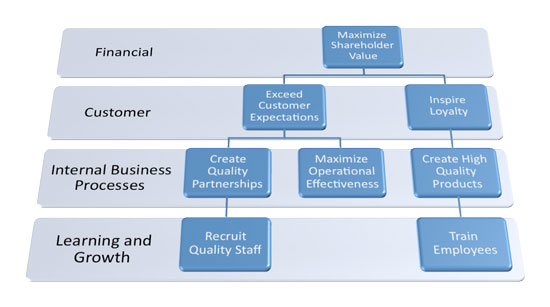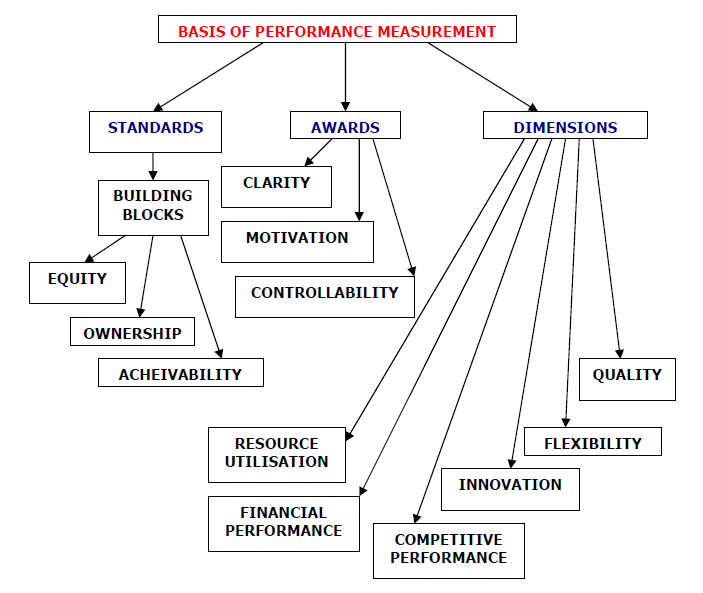In the late 1980s, organisations started realizing that, in order to assess the overall health and performance of the organisation, it was important to measure and manage non-financial measures also in addition to the traditional financial measures such as profits, share values, sales volumes etc. Traditional financial measures are usually the lag indicators of the business performance and tell the story of the past. They do not provide any insight into the intangible assets and capabilities that need to be developed in order to be able to achieve the desired financial results. For example, front-line workers in a manufacturing set up are far removed from these financial measures and have no idea about how their day to day work translates into financial results.… Read the rest
Performance Management
Fitzgerald and Moon’s Building Block Model
Fitzgerald and Moon’s Building Block Model suggests the solution of performance measurement problems in service industries. But it can be applied to other manufacturing and retail businesses to evaluate business performance.
Fitzgerald and Moon has provided a framework for performance management in service organization using three criteria, called as building blocks, they include, standards of performance (against these dimensions are measured to review performance), rewards for performance (rewards are necessary for achieving standards of performance) and dimensions of performance (these are measures of performance).
1. Standards: You can think of standards as rules that employees of a company must follow in order to achieve the long term objective of the organization.… Read the rest
Orthodox and Radical Critique of Performance Appraisal Process
Every organization has some goals and to achieve those goals organization hire people who can perform as per their standards to enable the organisation achieve its mission and vision. So performance is the key to achieve organisational goals. But to keep records and to analyse the performance, organisation needs to follow a specific processes which is known as “Performance Appraisal”. The important aspect for an organisation is not just to recruit good employees but also to retain them. Good working environment, promotions, career growth, rewards and recognition in return of their good performance will automatically retain the employees with the organisation.… Read the rest
Factors Affecting Organizational Performance
In this uncertain economic and social climate there are many factors that affect the organizational performance. The most essential factors affecting organizational performance are Leadership, Motivation, Organisational Culture and Knowledge Management.
1. LeadershipLeadership is the prime factor affecting the success or failure of organisations. It is the process in which one individual exerts influence over others. Leadership is a process that enables a person to influence others to achieve a goal and directs an organisation to become rational and consistent. In organisations where there is faith in the leaders, employees will look towards the leaders for almost everything. During drastic change in times, employees will perceive leadership as supportive, concerned and committed to their welfare, while at the same time recognizing that tough decisions need to be made.… Read the rest
Obstacles to Effective Organizational Performance
Over the past decade there is an abundance of evidence, which could be produced to say that successful organizations are managed by efficient managers. Success in the long run can be ensured only through effective management. Successful managers foster sustainable growth through their skills, attributes and personal qualities. There is a distinction between common sense and common knowledge. Knowing things is different from doing things. Being able to analyze a case, identify a problem, and suggest a correct solution makes a manager more effective. Out of all the characteristics that make an effective organization, the most important factor is the quality and alignment of the human resources.… Read the rest
Wage Issues under Collective Bargaining
Almost all contract negotiations pivot upon, and most grievances and arbitration procedures thus ultimately deal with, four major areas : (1) wages and issues that can be directly related to wages; (2) employee benefits or economic “fringe” supplements to the basic wage rate; (3) “institutional” issues that deal with the rights and duties of employers and trade unions; and (4) “administrative” clauses that treat such subjects as work rules and job tenure.
Probably no issues under collective bargaining continue to give rise to more difficult problems than do wages and wage-related subjects. When negotiations reach a stalemate, they frequently do so because management and trade union representatives are not able to find a formula to resolve wage disputes. … Read the rest




